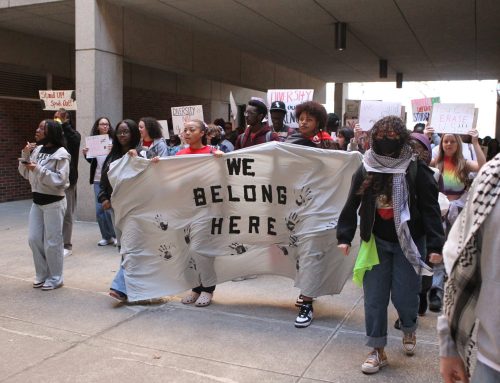By Madeline Tudor
It’s 11 p.m. in Ekstrom, the trashcans are filled with Starbucks cups and energy drink cans and someone is coughing in the corner, distracting you from studying during your all-nighter. This is the average student’s idea of “normal”.
College environments can bring about illness and unhealthy habits through the entirety of the semester. If students want to succeed academically and socially, health needs to be taken more seriously, beyond just washing our hands.
An upper respiratory infection like the flu can thrive in dorms and other shared facilities. Being sick can result in missed class days and decreased academic performance. Unfortunately, flu vaccination rates on United States college campuses are strikingly low — between 8% and 39%.
Campus Health Services provides preventative and acute care for students. Appointments can be made over the phone at (502) 852-6479 for the Belknap Campus and (502) 852-6446 for the HSC Campus. Starting this month, flu vaccines will be available in Student Activities Center room W107 on the Belknap Campus from 10 a.m. to 3 p.m. September 30th to October 2nd. More dates will be available here.
Staying sexually healthy should be intentional. Even if your hookups are spontaneous, there is absolutely a need for casual conversation regarding sexual health. Young people in college make up just over 25% of the sexually active population, but account for 50% of the sexually transmitted infection cases annually in the United States. Reducing the stigma of sexual activity will improve both student and public health overall.
Planned Parenthood, Campus Health Services and other off-site clinics can all test, diagnose and treat STIs. Free condoms and HPV vaccines are provided at these locations as well.
Students also tend to normalize the “grind culture” during the academic semester, to the detriment of their health. As of fall 2024, over 40% of college students reported getting an average of only 2-6 hours of sleep on a weeknight, despite adults needing 7-8 hours of sleep each night for optimal performance. With many of our students being a part of the Metropolitan College or UPS Program working third shift during the week, it is easy to see how sleep can be far down on the list of things to prioritize.
You can study as much as you’d like for your upcoming exams, but you’re doing yourself a disservice by not believing that enough sleep is essential to health. Students should make an appointment with the Student Success Center in the Belknap Academic Building by email or phone if they are struggling with time management causing a lack of sleep, or if they just have any general problems and are not sure where to turn.
Stress and burnout during the semester can lead to anxiety and/or depression, and U of L students are not an exception. About 70% of college students have struggled with mental health since starting college. This is a major concern, as these problems can affect your energy level, concentration, performance and personal relationships.
Students can connect with the Counseling Center by phone at (502)-852-6585 to inquire about services and to schedule an appointment for counseling. It is also wise to contact your professors when struggling with mental health if it’s affecting your coursework and studying.
Staying healthy in college is about balance. From flu shots to safer sex, better sleep and caring for mental health, individual choices add up to a collective impact. To thrive, we as students must start treating health like a priority, not an afterthought.
Madeline Tudor is a student in the School of Public Health and Information Sciences
and currently works at the Kentucky Department of Public Health in the Division of Lab
Services.






